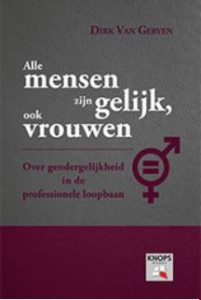International Women’s Day (8 March) is observed to chronicle the struggle to eliminate discrimination against women. It is a credit to the movement that we are making progress in regards to increasing the number of women in the workplace. It is rare to find the man that admits to treating women unequally. Having a lack of women on a team, is often attributed to not finding them. In addition when we look around, we see many women in the work place. Almost every man will tell you that he treats women equally and has many women in his team and, if he has not, it is because they are hard to find.
long-standing bias
We have been conditioned culturally, by a long-standing bias: women should be at home to take care of their partner and children. This bias unconsciously influences all our gendered and non-gendered actions and decisions. This explains the thinking that women have achieved equality and sufficient chances, but we do not see that we do not give them the same opportunities to jobs and promotion as we give men. As a result, many women feel they are not treated equally compared to their male colleagues and do not get the same chances or are forced to work harder to get the same professional recognition.
In addition, women are still, for a large majority, responsible for the household; and have to combine outside work with taking care of the family. Many women have two jobs: working during the day and taking care of the children and the household at night.
Combination of both (the unconscious bias with the feeling that they are not equally appreciated, and the combination of work with the household) results in many women abandoning their career. This trend is reinforced because it is in line with social expectations for women to leave work, choosing to take care of the family; making it easier to take that transition. While men who wish to work part time to take on family responsibility are frowned upon, which makes them hesitate, reconsider their decision, and continue to invest fully in their career.
Breaking the chain
We need to break this gender inequality. This requires courage and innovation. Indeed, it is easy for an employer to not do anything as changing this situation relates to the private life of people, which is generally, and by law considered to be outside the scope of the professional world. We argue that we are helpless in face of this situation. This is not true.
We can take measures to make it easier for women to build a career and continue to work, and simultaneously facilitate men to choose to take more time for parenthood. Of course, measures should not be stigmatizing if not they will result in the opposite: people not using the opportunities presented.
It is the responsibility of business leaders to take these measures, impose KPI’s to the managers for the implementation and encourage women and men alike to apply the measures. One of them is to offer parent leave to both men and women. Another is to make sure that for any job or promotion a sufficient (representative?) number of women are among the candidates. It is also important to encourage by regularly discussing the benefits of the measures, so that both men and women see that the firm appreciates people using the measures proposed.
An equal representation of men and women on all levels of a business is essential for better results. Numerous studies show that when women and men are equally represented, the business results are much better. Gender disparity is a condition to creativity, which is required for innovation, and innovation is what today makes a business better than its competitors.
Past President of the Brussels Bar
***
Dirk Van Gerven is een absolute voorvechter van gelijkheid tussen man en vrouw. Hij is auteur van het boek “Alle mensen zijn gelijk, ook vrouwen – Over gendergelijkheid in de professionele loopbaan” waarin hij de noodzaak benadrukt van de gelijke behandeling van vrouwen en mannen in het professionele leven.





0 reacties